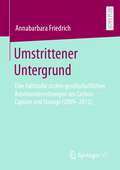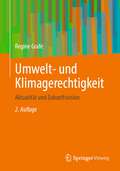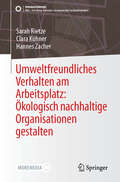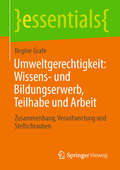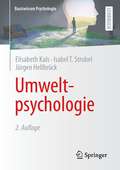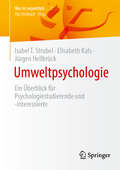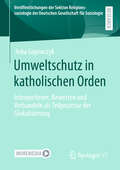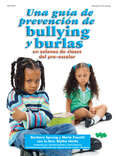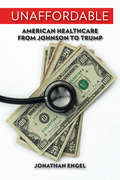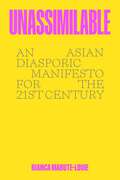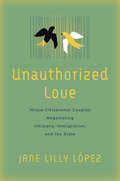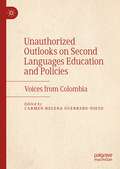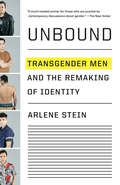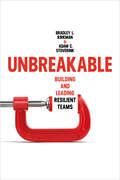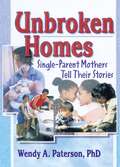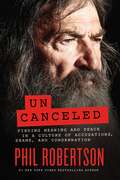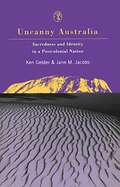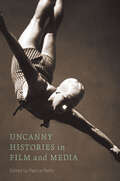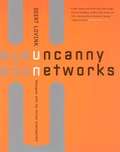- Table View
- List View
Umstrittener Untergrund: Eine Fallstudie zu den gesellschaftlichen Auseinandersetzungen um Carbon Capture and Storage (2009-2012)
by Annabarbara FriedrichDie Autorin analysiert die gesellschaftlichen Auseinandersetzungen um den frühen Implementierungsversuch einer Carbon Dioxide Removal Technologie. Diese Maßnahmen sind vom Weltklimarat als ein Baustein zur Eindämmung des Klimawandels anerkannt. Die EU setzte eine solche Technologie, Carbon Capture and Storage (CCS), bereits im Jahr 2009 auf die politische Agenda der Mitgliedstaaten. Die Arbeit untersucht die restriktive Regulierung der Kohlendioxidabscheidung und –speicherung in Deutschland, die im journalistisch-öffentlichen Diskurs auch als gescheitert dargestellt wird. Statt die (fehlende) öffentliche Akzeptanz von CCS zu erklären, untersucht die Arbeit die gesellschaftliche Politisierung des Technologie-Sets. Auf der Grundlage von Theorieansätzen der Science and Technology Studies werden die Deutungsrahmen von Interessengruppen auf Bundesebene analysiert. Die Inhaltsanalyse, der öffentlichen Dokumente von Gesellschaftsakteuren im Kontext des Gesetzgebungsverfahrens (2009-2012), zeigt die Verknüpfung von Carbon Capture and Storage und bestehenden soziotechnischen Systemen sowie deren gesellschaftspolitische Kontexte. Die qualitative Analyse behandelt ein vergangenes Beispiel einer umstrittenen technologischen Intervention. Dies ist zugleich zukunftsweisend, da nachträgliche Methoden der CO2-Entnahme aktuell im Zusammenhang von sog. unvermeidbaren Restemissionen erneut diskutiert werden.
Umwelt- und Klimagerechtigkeit: Aktualität und Zukunftsvision
by Regine GrafeEs wird die Komplexität von Umweltverschmutzung und Gesundheitsbeeinträchtigung im Kontext von sozialer Indikation dargestellt. Mit Hilfe von Sozialindikatoren wird aufgezeigt, wie Umweltverschmutzung, Gesundheitszustand, Bildungsteilhabe und Arbeitswelt auf die Menschen, insbesondere in Ballungsgebieten und in ausgewählten Innenstadtbereichen sowie in Satelitenstädten unmittelbar zusammenhängen. Die Bewertungsgrößen Predicted Mean Vote (PMV) und Physiological Equivalent Temperature (PET) werden im Kontext der Humanbiometereologie (HBM) ausführlich diskutiert Stadtklimatologie und Geometrie der Stadtarchitektur werden in Hinblick auf die urbane Gesundheit und die soziale Beeinflussungen der Bewohner dargestellt.
Umwelt- und Klimagerechtigkeit: Digitalisierung, Energiebedarfe, Klimastörung und Umwelt(un)gerechtigkeit (essentials)
by Regine GrafeDer Zusammenhang von Umweltzerstörung und Klimastörung infolge der sich rasant entwickelnden Digitalisierung in allen Lebensbereichen der Menschen wird kritisch hinterfragt. Der Energiebedarf für die aktuell weltweit genutzten digitalen Endgeräte bewegt sich derzeit im Terra-Watt-Bereich. Diese Energiemenge wird noch immer mehrheitlich aus fossilen Energiequellen gewonnen, gefolgt von biologischen Quellen wie Mais, Raps, Getreide, Palmen und weitere. Der sich rasant entwickelnde Plattformkapitalismus der GAFA-Monopole und weiteren hat zu einem Anstieg des Energiebedarfs für digitale Endgeräte gesorgt. Die Folgen sind eine vermehrte Freisetzung von Treibhausgasen und vor allem von Abwärme, die einen nicht unmaßgeblichen Anteil der Störung der Wärmebalance und damit der Klimastörung hat. Digitalisierung bewirkt darüber hinaus auch gesellschaftliche Veränderungen wie neue Arbeitsmodelle und Arbeitszeitmodelle und erfordert neue, nämlich digitale, Kompetenzen. Der damit verbundene Einschnitt in die gesellschaftlichen Strukturen zeigt sich bereits in einer steigenden Vereinzelung der Menschen, die mit Identitätsverlust, Verhäuslichung und Desozialisation einhergeht.
Umwelt- und Ökologiebewegungen: Ein Überblick (essentials)
by Jens Boscheinen Laurens BortfeldtEin junges Mädchen aus Schweden schafft, was viele über Jahrzehnte versucht haben. Greta Thunberg und die Fridays for Future-Bewegung schlagen Alarm und die Politik hört nicht nur zu, sondern ist angesichts der Kraft der sozialen Bewegung dazu gezwungen, aktiv zu handeln. Das vorliegende essential betrachtet die Umweltbewegungen in Deutschland der vergangenen 50 Jahre, gibt Einblicke in die Denkweise der Fridays for Future-Bewegung und ordnet diese ein.
Umweltfreundliches Verhalten am Arbeitsplatz: Ökologisch nachhaltige Organisationen gestalten (SDG - Forschung, Konzepte, Lösungsansätze zur Nachhaltigkeit)
by Hannes Zacher Sarah Rietze Clara KühnerDieses Buch vereint die arbeits- und organisationspsychologische Forschung zu ökologischer Nachhaltigkeit mit praxisnahen Lösungen. Es beleuchtet individuelle Einflussfaktoren auf umweltfreundliches Verhalten, sowie die Rolle von Führung („Green Leadership&“), Personalpraktiken („Green HRM&“), Teamarbeit und Organisationskultur. Es gibt konkrete Werkzeuge an die Hand und beschreibt evidenzbasierte Interventionsansätze für die ökologische Transformation. Fallbeispiele und Interviews machen deutlich, wie Organisationen ihre Prozesse und Kulturen gestalten können, um umweltfreundliches Verhalten zu fördern.
Umweltgerechtigkeit: Arbeit, Sozialisation, Teilhabe und Gesundheit (essentials)
by Regine GrafeUnter Einbindung des Umweltgerechtigkeitsansatzes, der die Gesundheitsgerechtigkeit impliziert, werden Fragen zur Bedeutung von non-formaler und formaler Bildung im Kontext der Sozialisation des Einzelnen in einer sich verändernden Gesellschaft gestellt. Wieviel und vor allem welche Art von Teilhabe ermöglicht die Gesellschaft aktuell und vor welchen Herausforderungen steht sie in Zukunft? Welche zukunftsfähigen Bildungsinhalte müssen vermittelt werden für die sich aktuell rasant verändernde Gesellschaft? Es bedarf nicht nur neuer Wissens- und Kompetenzvermittlung, sondern auch eines Paradigmenwechsels beim Arbeitsschutz. Was bedeutet das für die Gesellschaft und den Einzelnen? Es geht dabei auch um Assimilation, Integration und Onboarding. Wer wird die notwendigen Bildungsinhalte zukünftig vermitteln und mit welchem Anspruch? Welche Rolle wird die Arbeits(um)welt dabei spielen? Fragen, die aktuell gestellt werden müssen, um gesellschaftspolitische Antworten darauf zu finden.
Umweltgerechtigkeit: Zusammenhang, Verantwortung und Stellschrauben (essentials)
by Regine GrafeAusgehend vom Konzept des „Sozialen Raumes“, der im ganzheitlichen Begriff der Umwelt verankert ist, stellen sich Fragen nach dem Einfluss sozialer Räume auf den Menschen. Welchen Einfluss haben Lern- und Arbeitsumwelt? Wie ist es mit Chancengleichheit des Einzelnen und seiner Teilhabe bestellt? Wie hängen Wissen und Bildung zusammen? Nicht jeder, der viel weiß, ist auch gebildet. Welche Bedeutung hat die antizipatorische Bildung in der Familie und welche der Arbeits-, Lern- und Lebensumwelt? Fragen, die zweifelsohne mit sozioökonomischen Bedingungen eng zusammenhängen. Aber ist das ausschließlich darauf zu reduzieren? Wie wird die Zukunft der Arbeitswelt als Wissenswelt und damit deren Einfluss auf den Einzelnen aussehen? Welche Kompetenzen werden erforderlich sein für diese neue Arbeitswelt und wer wird sie vermitteln? Welche Bildungsinhalte werden deren soziale Räume vermitteln und mit welchem Ziel? Wenn Wissen zur Ware wird und damit beliebig, wer übernimmt dann die Verantwortung für dessen Vergegenständlichung als Produkt?
Umweltpsychologie (Basiswissen Psychologie)
by Elisabeth Kals Jürgen Hellbrück Isabel T. StrubelDie Umweltpsychologie befasst sich mit Mensch-Umwelt-Wechselwirkungen als Beziehungen zwischen der physisch-materiellen und der soziokulturellen Außenwelt sowie menschlichem Erleben und Verhalten. Diese vollständig überarbeitete zweite Auflage gibt einen gut strukturierten, klar verständlichen Überblick über die Themen und Entwicklungen dieser immer bedeutsamer werdenden Teildisziplin der Psychologie und macht deutlich, dass die Umweltpsychologie ein hochrelevantes Forschungs- und Anwendungsfeld der Gegenwart und Zukunft ist.
Umweltpsychologie: Ein Überblick für Psychologiestudierende und -interessierte (Was ist eigentlich …?)
by Elisabeth Kals Jürgen Hellbrück Isabel T. StrubelDieses Lehrbuch gibt einen kurzen Überblick über das Anwendungsfach Umweltpsychologie. Die Umweltpsychologie befasst sich mit Mensch-Umwelt-Wechselwirkungen als Beziehungen zwischen der physisch-materiellen und der soziokulturellen Außenwelt sowie menschlichem Erleben und Verhalten. Sowohl psycho-soziale und gesundheitspsychologische Wirkungen der Umwelt auf den Menschen als auch psychologische Bedingungsfaktoren menschlicher Einflüsse auf die Umwelt werden in den Blick genommen. Das Buch bietet allen an psychologischen Themen Interessierten einen ersten, gut verständlichen Einblick in das Themengebiet der Umweltpsychologie.
Umweltschutz in katholischen Orden: Interpretieren, Bewerten und Verhandeln als Teilprozesse der Glokalisierung (Veröffentlichungen der Sektion Religionssoziologie der Deutschen Gesellschaft für Soziologie)
by Jiska GojowczykUmweltschutzziele wie die Bewahrung der Schöpfung werden selbst in hierarchisch organisierten Gemeinschaften wie katholischen Orden auf unterschiedlichste Weise interpretiert, bewertet und verhandelt. Während manche Mitbrüder der gleichen Kommunität basierend auf einem Ziel ganz verschieden handeln, interpretieren andere es auch über geographische und nationale Grenzen hinweg sehr ähnlich. Mit der vorliegenden ethnographischen Studie werden die Unterschiede und Gemeinsamkeiten erkennbar. Es zeigt sich: Das Ziel einer Gemeinschaft markiert nicht einen Weg, sondern viele. Wer religiösen Umweltschutz untersucht, sollte deswegen mehr als einen Weg bedenken – einschließlich Umleitungen und Kreuzungen.
Un-Veiling Dichotomies: European Secularism and Women’s Veiling (Boundaries of Religious Freedom: Regulating Religion in Diverse Societies)
by Giorgia BaldiThis book analyzes the implication of secular/liberal values in Western and human rights law and its impact on Muslim women. It offers an innovative reading of the tension between the religious and secular spheres. The author does not view the two as binary opposites. Rather, she believes they are twin categories that define specific forms of lives as well as a specific notion of womanhood. This divergence from the usual dichotomy opens the doors for a reinterpretation of secularism in contemporary Europe. This method also helps readers to view the study of religion vs. secularism in a new light. It allows for a better understanding of the challenges that contemporary Europe now faces regarding the accommodation of different religious identities. For instance, one entire section of the book concerns the practice of veiling and explores the contentious headscarf debate. It features case studies from Germany, France, and the UK. In addition, the analysis combines a wide range of disciplines and employs an integrated, comparative, and inter-disciplinary approach. The author successfully brings together arguments from different fields with a comparative legal and political analysis of Western and Islamic law and politics. This innovative study appeals to students and researchers while offering an important contribution to the debate over the role of religion in contemporary secular Europe and its impact on women’s rights and gender equality.
Una Serie introductoria: Un enfoque sociocultural del comportamiento
by Connor Whiteley¿Cómo afecta la globalización a nuestro comportamiento? ¿Afecta nuestra cultura a nuestros hábitos de compra? ¿Podría la aculturación explicar los niveles de obesidad en los emigrantes? Estas son sólo algunas de las preguntas interesantes e importantes que exploraremos en este libro mientras exploramos cómo los factores sociales y culturales afectan nuestro comportamiento. Así que, únanse a mí mientras exploramos juntos el fascinante mundo de la psicología social en este libro con un tono de conversación intrigante que claramente desglosa y evalúa críticamente los conceptos y teorías para que todos puedan disfrutar de las maravillas de la psicología.... ¡y no tengan un dolor de cabeza al final!
Una guía de prevención de bullying y burlas: en salones de clases de pre-escolar
by Dr Blythe Hinitz Barbara Sprung Merle FroschlDurante los años pre-escolares la mayoría de los niños tienen sus primeras experiencias de formación y unión social con sus pares. Durante los años pre-escolares es natural que los niños experimentan con interacciones sociales mientras aprenden sobre el mundo. Cuando el colegio logra crear un ambiente de cuidado mutuo se reduce la posibilidad de que los niños manifiesten un comportamiento negativo (así como la burla y la intimidación). Con la nueva traducción del libro Una guía de prevención de bullying y burlas en salones de clases de pre-escolar, los maestros de niños pequeños pueden abordar estos comportamientos antes de que se desarrollen.El acoso y la burla puedan tener un impacto negativo en el aprendizaje del niño, afectando su salud física y su bienestar emocional. El libro Una guía de prevención de bullying y burlas en salones de clases del pre-escolar comparte actividades, que puedan tomar lugar en el salón de clases y con la participación de la familia para desarrollar la empatía en los niños creando un clima de respeto mutuo en el salón. Hay más de 40 actividades que se enfocan en disminuir y controlar la burla y la intimidación mientras cultivan la amistad, la comunidad y los sentimientos positivos; los maestros de niños pequeños aprenden a crear un ambiente en el que todos los niños se sienten seguros, cómodos y bienvenidos.Barbara Sprung y Merle Froschl son las co-directoras del Educational Equity Center (EEC). Dra. Blythe Hinitz es la coordinadora y catedrática de enseñanza de la educación pre-escolar en The College of New Jersey (TCNJ).
Unaccompanied: The Plight of Immigrant Youth at the Border (Critical Perspectives on Youth #11)
by Emily Ruehs-NavarroExplores how humanitarian aid workers help and hinder the care of unaccompanied children as they arrive in the United StatesEvery year, tens of thousands of children cross into the United States without a legal guardian at their side, often fleeing violence and poverty in their countries of origin. In Unaccompanied, Emily Ruehs-Navarro shows us one aspect of their heartbreaking journeys, as seen through the eyes of the aid workers who try—but too often fail—to help them. Drawing on interviews with aid workers, migrant children, and others, Ruehs-Navarro follows unaccompanied youth as they seek help from a wide range of professionals. From legal relief organizations to family reunification specialists, she shows us how different aid workers may choose to work for, with, or against unaccompanied immigrant youth, deciding whether they should be treated as refugees, child dependents, or, in some cases, criminals. Ruehs-Navarro highlights how aid workers, and the systems they represent, often harm the very children they are designed to help. Unaccompanied brings into focus the plight of immigrant youth at the border, illuminating our failure to manage the human casualties of a growing crisis.
Unaffordable: American Healthcare from Johnson to Trump
by Jonathan EngelWritten for nonexperts, this is a brisk, engaging history of American healthcare from the advent of Medicare and Medicaid in the 1960s to the impact of the Affordable Care Act in the 2010s. Step by step, Jonathan Engel shows how we arrived at our present convoluted situation, where generic drugs prices can jump 1,000 percent in a day and primary care physicians can lose 20 percent of their income at the stroke of a Congressional pen. Unaffordable covers, in a conversational style punctuated by apt examples, topics ranging from health insurance, pharmaceutical pricing, and physician training to health maintenance organizations and hospital networks. Along the way, Engel introduces approaches that other nations have taken in organizing and paying for healthcare and offers insights on ethical quandaries around end-of-life decisions, neonatal care, life-sustaining treatments, and the limits of our ability to define death. While describing the political origins of many of the federal and state laws that govern our healthcare system today, he never loses sight of the impact that healthcare delivery has on our wallets and on the balance sheets of hospitals, doctors' offices, government agencies, and private companies.
Unassimilable: An Asian Diasporic Manifesto for the Twenty-First Century
by Bianca Mabute-LouieA scholar and activist’s brilliant socio-political examination of Asian Americans who refuse to assimilate and instead build their own belonging on their own terms outside of mainstream American institutions.In this hard-hitting and deeply personal book, a combination of manifesto and memoir, scholar, sociologist, and activist Bianca Mabute-Louie transforms the ways we understand race, class, citizenship, and the concept of assimilation and its impact on Asian American communities from the nineteenth century to present day.UNASSIMILABLE opens with a focus on the San Gabriel Valley (SGV), the first Asian ethnoburb in Los Angeles County and in the nation, where she grew up. A suburban neighborhood with a conspicuous Asian immigrant population, SGV thrives not because of its assimilation into Whiteness, but because of its unapologetic catering to its immigrant community.Mabute-Louie then examines “Predominantly White Institutions With A lot of Asians” and how these institutions shape the racial politics of Asian Americans and Asian internationals, including the fight against affirmative action and the fight for ethnic studies. She moves on to interrogate the role of the religion, showing how the immigrant church is a sanctuary even as it is an extension of colonialism and the American Empire. In the book’s conclusion, Bianca looks to the future, boldly proposing a reconsideration of the term Asian American for a new label that better clarifies who Asians in America are today.UNASSIMILABLE offers a radical vision of Asian American political identity informed by a refusal of Whiteness and collective care for each other. It is a forthright declaration against assimilation and in service of cross-racial, anti-imperialist solidarity and revolutionary politics. Scholarly yet accessible, informative and informed, this book is a major addition to Ethnic Studies and American Studies.
Unauthorized Love: Mixed-Citizenship Couples Negotiating Intimacy, Immigration, and the State
by Jane Lilly LópezA rich, narrative exploration of the ways love defies, survives, thrives, and dies as lovers contend with US immigration policy. For mixed-citizenship couples, getting married is the easy part. The US Supreme Court has confirmed the universal civil right to marry, guaranteeing every couple's ability to wed. But the Supreme Court has denied that this right to marriage includes married couples' right to life, liberty, and the pursuit of happiness on US soil, creating a challenge for mixed-citizenship couples whose individual-level rights do not translate to family-level protections. While US citizens can extend legal inclusion to their spouses through family reunification, they must prove their worthiness and the worthiness of their love before their relationship will be officially recognized by the state. In Unauthorized Love, Jane López offers a comprehensive, critical look at US family reunification law and its consequences as experienced by 56 mixed-citizenship American couples. These couples' stories––of integration and alienation, of opportunity and inequality, of hope and despair––make tangible the consequences of current US immigration laws that tend to favor Whiteness, wealth, and heteronormativity, as well as the individual rather than the family unit, in awarding membership and official belonging. In examining the experiences of couples struggling to negotiate intimacy under the constraints of immigration policy, López argues for a rethinking of citizenship as a family affair.
Unauthorized Outlooks on Second Languages Education and Policies: Voices from Colombia
by Carmen Helena Guerrero-NietoThis edited book presents a critical vision of language and education policies and practices in Colombia, examining neoliberal perspectives which influence the promotion of English at all levels in the Colombian educational system. Some of the chapters emphasize questions of language teacher recognition and empowerment, while others focus on both teachers and students’ visions of national policies, particularly with regard to colonial and Eurocentric discourses and subsequent discriminatory practices. The volume throws light on recent language and education policies and practices in a South American country where much current research in this area is published in Spanish but not in English, and it gives visibility to voices that are often missing from the global conversation around English language teaching (ELT). Making these voices heard is part of a decolonial project that gives legitimacy to "unauthorized outlooks", embodies knowledge, and focuses on presenting alternatives to second language teaching-learning and research practices from the Global North ontoepistemology. This book will be of interest to students and scholars of ELT, Language Policies and Planning, Applied Linguistics, and Postcolonial and Decolonial Studies. It also has international appeal, as its localized gaze can bring about important considerations regarding other local knowledges.
Unbound: Transgender Men and the Remaking of Identity
by Arlene SteinAn intimate portrait of a new generation of transmasculine individuals as they undergo gender transitions Award-winning sociologist Arlene Stein takes us into the lives of four strangers who find themselves together in a sun-drenched surgeon’s office, having traveled to Florida from across the United States in order to masculinize their chests. <P><P>Ben, Lucas, Parker, and Nadia wish to feel more comfortable in their bodies; three of them are also taking testosterone so that others recognize them as male. <P>Following them over the course of a year, Stein shows how members of this young transgender generation, along with other gender dissidents, are refashioning their identities and challenging others’ conceptions of who they are. <P>During a time of conservative resurgence, they do so despite great personal costs. <P>Transgender men comprise a large, growing proportion of the trans population, yet they remain largely invisible. In this powerful, timely, and eye-opening account, Stein draws from dozens of interviews with transgender people and their friends and families, as well as with activists and medical and psychological experts. <P>Unbound documents the varied ways younger trans men see themselves and how they are changing our understanding of what it means to be male and female in America.
Unbreakable: Building and Leading Resilient Teams
by Bradley L. Kirkman Adam StoverinkAn essential guide for managers and leaders on building resilient teams in turbulent times. As a result of global economic changes, new technologies, and increased competition, business environments are becoming increasingly turbulent and unpredictable, requiring new forms of resilient work teams. Due in part to the increasing complexity of business environments, more and more organizations worldwide are using teams of employees to respond to adversity. Whether it be new product development teams; business crisis response teams in companies; front line response teams such as fire, emergency medical technicians, or emergency room teams; research and development teams; or pharmaceutical development teams, employees can no longer rely on their own knowledge, skills, and abilities to get their work done. Rather, employees have to work collaboratively with one another and combine their expertise to achieve the synergy and breakthrough thinking that is necessary to be successful at completing complex tasks in today's dynamic environments. Today more than ever before, work teams must demonstrate resilience. In the face of volatile, complex, and ambiguous business environments, all teams inevitably suffer setbacks. Bradley L. Kirkman and Adam C. Stoverink provide in their new book the hands-on practical tips for building and leading resilient teams equipped to bounce back from those challenges. They highlight four team resources that are essential to any resilient team, including: team confidence, teamwork roadmaps, capacity to improvise, and psychological safety. These four resources are brought to life through compelling stories of teams that performed well in the face of adversity—and a few that didn't. They also provide leaders with step-by-step guidance for how to grow these resources in their own teams, whether they're in-person, remote, or hybrid. This book delivers all the tools necessary to build and lead resilient teams that are virtually unbreakable.
Unbroken Homes: Single-Parent Mothers Tell Their Stories
by J Dianne Garner Wendy A PatersonExplore the real-life triumphs and tragedies of single-parent mothers!Unbroken Homes is a “story quilt” of personal narratives constructed from in-depth, case study interviews of five single-parent mothers. The book chronicles their journeys as mothers, daughters, and women, in relationships and in solitude, displaying their stories in their own words like the squares of a multicolored quilt. Unbroken Homes breaks through the stigma associated with “broken homes” and provides a new perspective on the reorganization of American families.Unbroken Homes encourages you to rethink some damaging stereotypical assumptions about children from single-mother headed homes. Drawing information from family research, counseling, and a cross-section of social sciences, this book is pertinent to any professional who works with single parents or their children. Unbroken Homes does not deal with what is “typical” in the single-parenting experience, nor does it give advice or proselytize. Rather, its purpose is to discover the meaning that single-parent mothers bring to their own lives, helping you to understand the dynamics of single-parent families from a uniquely personal perspective.In Unbroken Homes you will witness the ways that these women: experience the ill effects of gender role socialization work to overcome stigma redefine ideals for family life and gender expectations balance responsibilities in and outside of their homes stretch finances to meet the needs of their families regain strength and self-confidence encourage their children's development affirm the strength of their families cope with depression develop networks of supportThis intensely personal collection of women's stories and reflections is a must read for everyone who seeks a better understanding of divorce, single-parenting, and being alone, from an insider's perspective.
Uncanceled: Finding Meaning and Peace in a Culture of Accusations, Shame, and Condemnation
by Phil RobertsonWin the War for Your Own IntegrityAfter Phil Robertson quoted Scripture in an interview with a national magazine, his hit show, Duck Dynasty, put him on &“indefinite hiatus.&” Phil immediately knew what had happened: he had become a target of cancel culture.Since that time, Phil has spoken out against public shaming, strategic campaigns to get Bible-believing employees fired, and other tactics that are wreaking havoc in our society. In a deeply divided country, with so many bent on condemning and silencing others, Phil calls for us to carry out the unifying message of Jesus Christ.In Uncanceled, Phil shares his own experiences with cancel culture as heencourages us to turn to Scripture as we navigate politics, personal conversations, and new cultural norms;helps us see the psychological and political motivations behind silencing conservative voices;reminds us that the goal is not to convince others to like us but to win the war for our own integrity by refusing to bow down to the god of political correctness; andshows us how to trade retaliation for the love and forgiveness that God offers.Uncanceled is a blueprint for standing up for the truth of Jesus Christ in a culture that has forgotten how to have respectful conversations. As Phil reminds us, when we embrace the truth that Jesus Christ already paid an enormous debt to cancel our sins, we find a path to redemption, a way to forgiveness, and a means for godly connection.
Uncanny Australia: Sacredness and Identity in a Postcolonial Nation
by Ken Gelder Jane M JacobsAboriginal claims for sacredness in modern Australia may seem like minor events, but they have radically disturbed the nation's image of itself. Minorities appear to have too much influence; majorities suddenly feel embattled. What once seemed familiar can now seem disconcertingly unfamiliar, a condition Ken Gelder and Jane M. Jacobs diagnose as 'uncanny'. In Uncanny Australia Gelder and Jacobs show how Aboriginal claims for sacredness radiate out to affect the fortunes, and misfortunes, of the modern nation. They look at Coronation Hill, Hindmarsh Island, Uluru and the repatriation of sacred objects; they examine secret business in public places, promiscuous sacred sites, ghosts and bunyips, cartographic nostalgia, reconciliation and democracy, postcolonial racism and New Age enchantments. Uncanny Australia is a challenging and thought-provoking work that offers a new way of understanding how the Aboriginal sacred inhabits the modern nation.
Uncanny Histories in Film and Media (Media Matters)
by Priya Jaikumar Masha Salazkina Peter Bloom Ellen C. Scott Cristina Venegas Jasmine Nadua Trice Alenda Chang Maria Corrigan Naomi DeCelles Hannah GoodwinUncanny Histories in Film and Media brings together a stellar lineup of established and emergent scholars who explore the uncanny twists and turns that are often occluded in larger accounts of film and media. Prompted by fresh archival research and new conceptual approaches, the works included here probe the uncanny as a mode of historical analysis that reveals surprising connections and unsettling continuities. The uncanny stands for what often eludes us, for what remains unfamiliar or mysterious or strange. Whether writing about film movements, individual works, or the legacies of major or forgotten critics and theorists, the contributors remind us that at the heart of the uncanny, and indeed the writing of history, is a troubling of definitions, a challenge to our inherited narratives, and a disturbance of what was once familiar in the uncanny histories of our field.
Uncanny Networks: Dialogues With the Virtual Intelligentsia
by Geert LovinkFor Geert Lovink, interviews are imaginative texts that can help create global, networked discourses not only among different professions but also among different cultures and social groups. Conducting interviews online, over a period of weeks or months, allows the participants to compose documents of depth and breadth, rather than simply snapshots of timely references.
